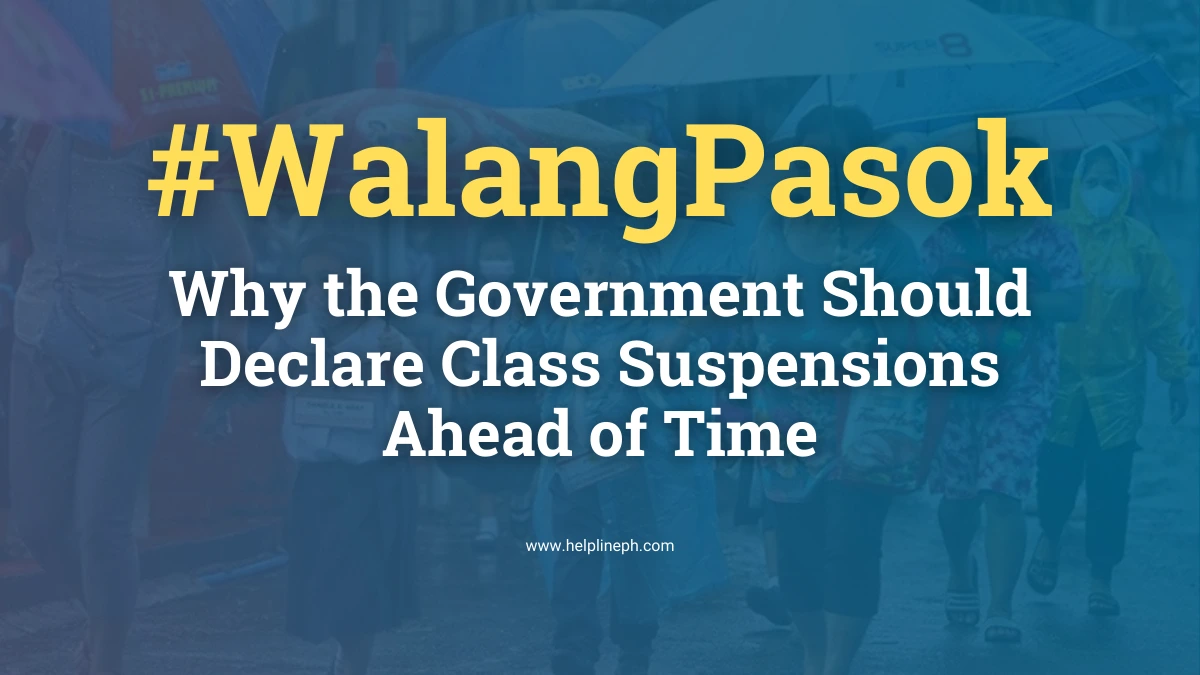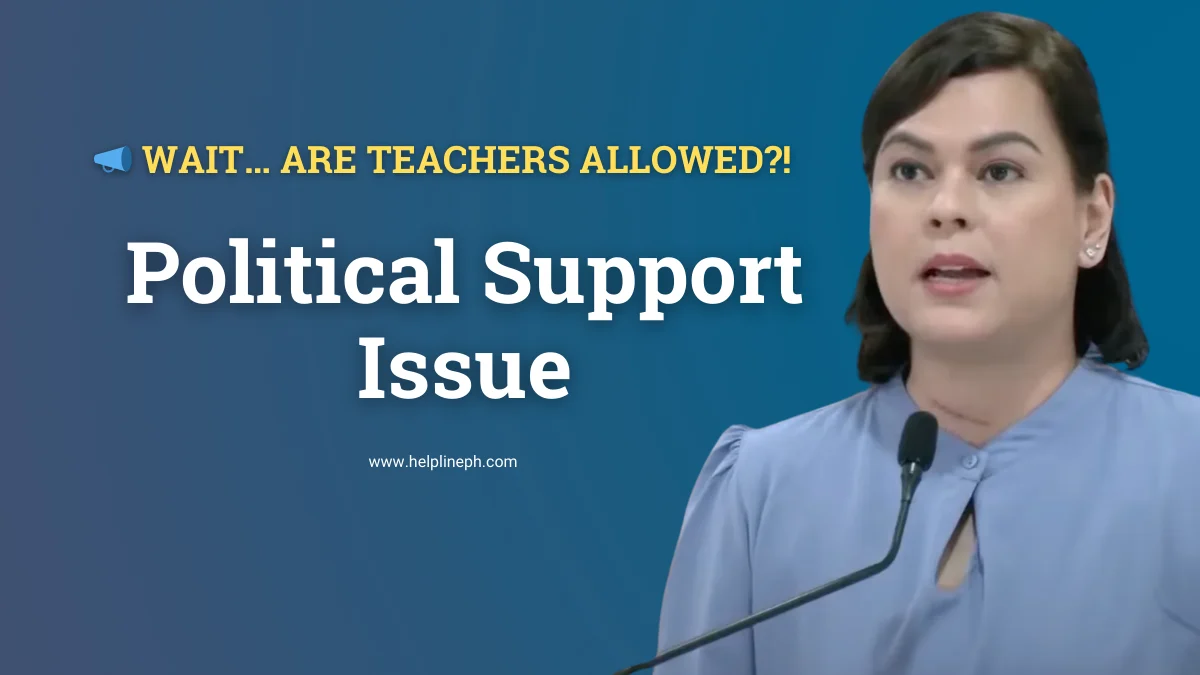Suspending classes during bad weather, especially typhoons, is an important step the government takes to protect students, teachers, and parents. The goal is to ensure safety by keeping people indoors rather than traveling through dangerous conditions. However, one issue that often arises is that many local government units (LGUs) announce the suspension too late, often between 8:00 to 8:30 AM, when most students and teachers are already on their way to school.
This practice causes a lot of unnecessary inconvenience and risk. Many students leave their homes between 5:00 AM and 8:00 AM, especially those who live far from their schools. By the time classes are suspended, many are already at school, soaked and uncomfortable from traveling in the bad weather. Both students and teachers face the same problem. So, it’s clear that the government should declare class suspensions ahead of time, ideally the night before or early in the morning, before students leave their homes. This can prevent unnecessary risks and make life easier for everyone.
The Risks of Late Class Suspension Announcements
1. Health Risks
When the weather is bad, like during a storm or heavy rain, traveling can be dangerous for both students and teachers. Many students leave home early in the morning and are exposed to cold, rain, and wind for long periods. This can lead to health issues like colds, fever, and even serious respiratory infections.
In some cases, students arrive at school already soaked, cold, and exhausted, only to find out that classes have been suspended. Not only is this a waste of time, but it also puts their health at risk. Teachers face the same problems, and since many of them have to arrive even earlier than the students, they are also exposed to the dangers of traveling in bad weather.
2. Safety Concerns
Traveling during a typhoon or stormy weather increases the chance of accidents. Flooded streets, slippery roads, and poor visibility due to heavy rain make it difficult for drivers and pedestrians alike. Students who rely on public transportation are at an even higher risk, as buses and jeepneys may encounter delays or accidents.
Late suspension announcements force students and teachers to return home in worsening conditions. This increases their exposure to road accidents or other weather-related hazards. If the suspension is declared early enough, this unnecessary risk can be avoided.
3. Emotional Stress
Aside from the physical risks, late class suspensions also cause emotional stress. Students are already stressed about their classes and assignments. Adding the uncertainty of whether or not classes will be suspended, especially during bad weather, only makes things worse.
Many students are left wondering if it’s worth risking their safety to go to school, or if they should wait for an official announcement. This puts additional pressure on both students and their parents, who want to ensure their children are safe while also making sure they don’t miss important classes.
Why Early Class Suspension Announcements Are Important
1. Prevents Unnecessary Travel
If the government announces class suspensions ahead of time, students, teachers, and parents can make better decisions. They can avoid traveling through bad weather, staying safe at home instead. Early announcements also give parents peace of mind, knowing that their children won’t be forced to risk their safety just to get to school on time.
For students who travel long distances, this is especially important. Many students wake up as early as 4:00 or 5:00 AM to make it to school on time. If classes are suspended after they’ve already left home, they’ve wasted their time and risked their health for no reason. Announcing suspensions earlier can prevent this situation.
2. Allows Schools to Plan
When the government announces class suspensions ahead of time, it allows schools to plan accordingly. Teachers can adjust their lesson plans, and schools can reschedule important events or exams. This is better for everyone, as it ensures that no one is caught off guard. Teachers won’t have to deal with empty classrooms due to late suspensions, and students won’t miss out on valuable lessons.
3. Reduces Traffic Congestion
In areas where class suspensions are announced late, there is often confusion on the roads. Many students, parents, and teachers try to head back home once they hear about the suspension. This causes heavy traffic, especially in urban areas. Early announcements can help reduce this problem by keeping people off the roads during dangerous weather.
4. Improves Communication
Announcing suspensions early also shows that the government and LGUs are prepared and proactive. It builds trust between the authorities and the public, as people feel reassured that their safety is being prioritized. Clear, timely communication is key to ensuring that everyone knows what to do during emergency situations.
Suggestions for Improvement
- Monitor Weather Closely: LGUs and school authorities should closely monitor weather reports, especially during the rainy season. By paying attention to weather forecasts, they can make informed decisions about class suspensions well in advance.
- Use Multiple Channels for Announcements: It’s important for the government to use various platforms to announce suspensions, such as social media, text messaging services, and television. This ensures that everyone gets the message in time. LGUs should also coordinate with local radio stations, which can be particularly helpful in rural areas.
- Set a Deadline for Announcements: The government should establish a deadline for announcing suspensions. For example, all announcements could be made by 5:00 AM at the latest, so that students, teachers, and parents have enough time to plan their day. If possible, announcing suspensions the night before would be even better.
- School Guidelines for Safety: Schools should have clear guidelines on what students and teachers should do if they are caught in bad weather on their way to school. They can set up designated waiting areas for students who arrive early, ensuring that they stay safe and dry while waiting for their parents to pick them up.
Conclusion
Suspending classes during typhoons or bad weather is necessary to protect students, teachers, and parents. However, these suspensions should be announced ahead of time to prevent unnecessary travel, avoid health risks, and reduce emotional stress.
By closely monitoring the weather, using multiple communication channels, and setting clear deadlines for announcements, the government and LGUs can make class suspensions more efficient and effective. This will ensure the safety of everyone involved while making sure that the education system runs smoothly even during bad weather.
Frequently Asked Questions (FAQs)
Why do LGUs often announce class suspensions late?
LGUs may wait for more accurate weather updates before making decisions. However, this can cause delays that inconvenience students and teachers.
What can parents do if classes are suspended late?
Parents should keep an eye on weather updates and school announcements. It’s also a good idea to have a backup plan in case the suspension is announced late, such as arranging for children to stay safe at a relative’s house near the school.
How can schools help during bad weather?
Schools can prepare by having designated waiting areas and clear guidelines for students and teachers during emergencies. Schools should also have contingency plans for canceled exams or lessons.
What is the best time for announcing class suspensions?
The best time would be the night before or at least by 5:00 AM, giving students, parents, and teachers enough time to adjust their plans.






